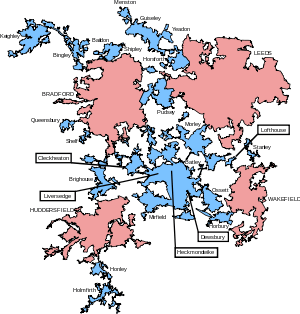West Yorkshire Urban Area
| West Yorkshire Urban Area | |
 West Yorkshire Urban Area map |
|
| Area | 487.8 km2 (188.3 sq mi) |
|---|---|
| Population | 1,777,934 |
| – density | 3,645/km2 (9,440/sq mi) |
| OS grid reference | SE455215 |
| Metropolitan county | West Yorkshire |
| Region | Yorkshire and the Humber |
| Country | England |
| Sovereign state | United Kingdom |
| Police | West Yorkshire |
| Fire | West Yorkshire |
| Ambulance | Yorkshire |
| EU Parliament | Yorkshire and the Humber |
The West Yorkshire Urban Area is a term used by the Office for National Statistics (ONS) to refer to a conurbation in West Yorkshire, England, based on the cities of Leeds, Bradford and Wakefield, and the large towns of Huddersfield and Halifax. However, it excludes towns such as Castleford, Pontefract and Wetherby which though part of the county of West Yorkshire are considered independently. There are substantial areas of agricultural land within the designated area - more than in any other official urban area in England - many of the towns and cities are only just connected with one another by narrow outlying strips of development.
Urban Subdivisions
The ONS gives the conurbation a population of 1,777,934 (2011 census),[1] which makes it the fourth-most populous in the UK. The ONS breaks the area down into the following sub-divisions:[1]
- Baildon
- Batley
- Bingley
- Bradford
- Brighouse
- Burley in Wharfedale
- Cleckheaton
- Dewsbury
- Guiseley
- Halifax
- Haworth
- Heckmondwike
- Holmfirth
- Horbury
- Horsforth
- Huddersfield
- Keighley
- Leeds
- Liversedge
- Menston
- Middlestown
- Mirfield
- Morley
- Netherton
- Ossett
- Otley
- Pudsey
- Robin Hood
- Rothwell
- Scholes
- Shipley
- Sowerby Bridge
- Thornton
- Wakefield
- Walton
- Yeadon
Notes: The ares of Lofthouse, Stanley, Honley, Queensbury and Shelf were subdivisions in the 2001 census
References
- 1 2 "2011 Census - Built-up areas". ONS. Retrieved 5 July 2013.
Coordinates: 53°43′N 1°38′W / 53.717°N 1.633°W